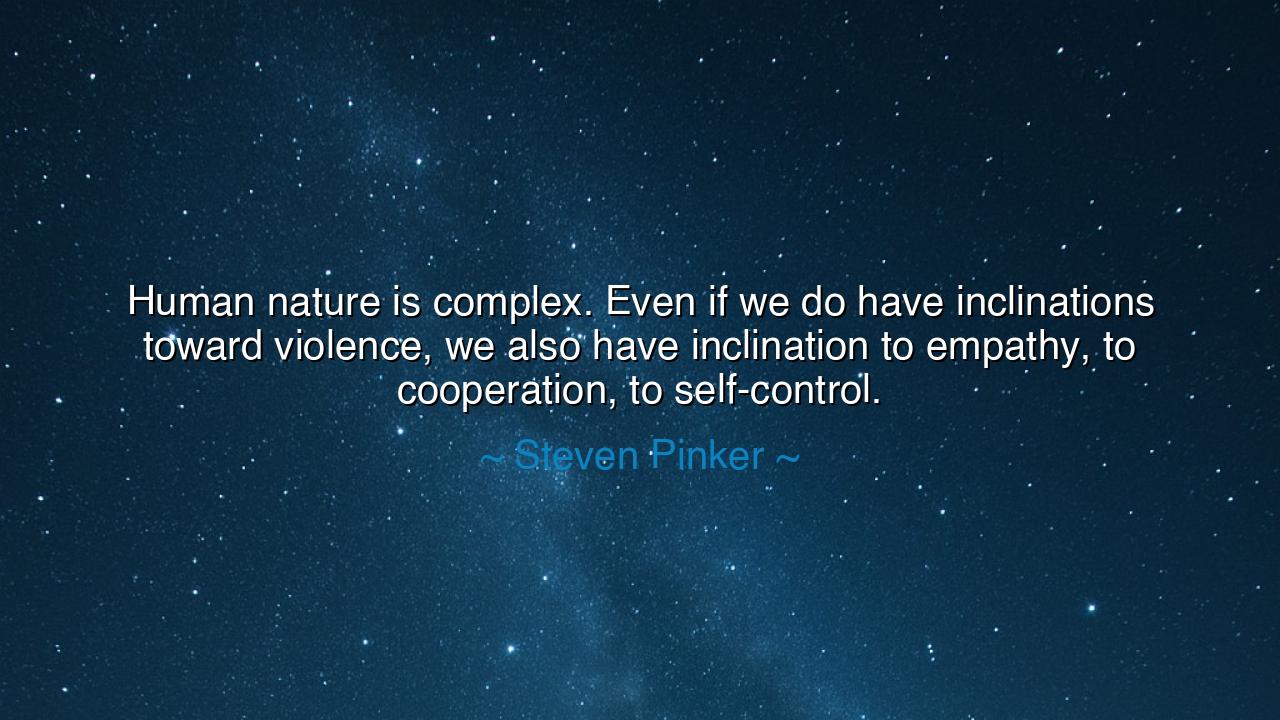
Human nature is complex. Even if we do have inclinations toward
Human nature is complex. Even if we do have inclinations toward violence, we also have inclination to empathy, to cooperation, to self-control.






Steven Pinker, thinker of the mind and chronicler of mankind’s long struggle, once spoke these words: “Human nature is complex. Even if we do have inclinations toward violence, we also have inclination to empathy, to cooperation, to self-control.” In this statement lies both caution and hope. For it is true that within us there burns the fire of destruction, yet alongside it glows the light of compassion. Man is not one thing only — not beast alone, nor angel alone — but a weaving together of contrary forces. To understand this complexity is to grasp the true struggle of life: to govern our darker inclinations with the nobler ones, and to choose, each day, the higher road.
The origin of this wisdom lies in Pinker’s work as a scholar of human history and psychology. In his studies of violence across centuries, he uncovered the paradox that though war and cruelty have stained the story of man, there has also been steady growth in peace, law, and empathy. Where once tribes slaughtered with impunity, nations now build institutions of justice. Where once vengeance ruled unchecked, now forgiveness and cooperation hold sway. His words remind us that violence is not our destiny, but merely one thread in the fabric of our being — balanced by threads of empathy and self-control that can be strengthened if we choose.
History offers shining proof of this truth. Consider the aftermath of the Second World War. The nations of Europe, who had slaughtered each other in fire and ruin, chose not to remain in cycles of hatred, but to build the European Union, an alliance founded on cooperation rather than rivalry. The same peoples who once burned cities now opened their borders and economies to one another. Here we see that human nature, though scarred by violence, was also capable of profound reconciliation and shared growth.
Or recall the story of Nelson Mandela. After decades in prison, he emerged not with bitterness, but with the spirit of empathy and self-control. Though he had every reason to call for vengeance against his oppressors, he instead called for forgiveness, for cooperation between black and white South Africans, for unity instead of war. His choice was not inevitable — it was the triumph of one part of human nature over another. By restraining violence with compassion, Mandela changed the fate of a nation and became a beacon to the world.
The lesson, then, is clear: we must never despair when we see cruelty, for cruelty is not the whole of man. Nor must we be naïve, pretending man is only gentle, for the roots of violence run deep. The truth is complexity: both are within us. And this is where our dignity lies — not in being flawless, but in the constant striving to let the higher powers of empathy and self-control govern the lower impulses of rage. To live with wisdom is to recognize this battle within, and to choose wisely in the moments that matter.
What, then, shall we practice? Let us cultivate self-control, mastering the anger that rises in us before it shapes our deeds. Let us nurture empathy, seeking to understand others even when they wound us. Let us embrace cooperation, remembering that our greatest achievements have come not from solitary conquest but from shared labor. In families, in nations, in the world, the path forward is not the glorification of violence but the strengthening of these gentler yet stronger powers.
Therefore, O children of the future, remember Pinker’s words: human nature is not simple. It is a battlefield of forces, some dark, some bright. But complexity is not weakness — it is possibility. If we honor the nobler inclinations within us, if we strengthen them through habit and choice, then we may overcome the legacy of blood with the promise of peace. The choice lies not in destiny, but in the daily struggle of the heart. And in that struggle, each of us is both warrior and victor.






AAdministratorAdministrator
Welcome, honored guests. Please leave a comment, we will respond soon